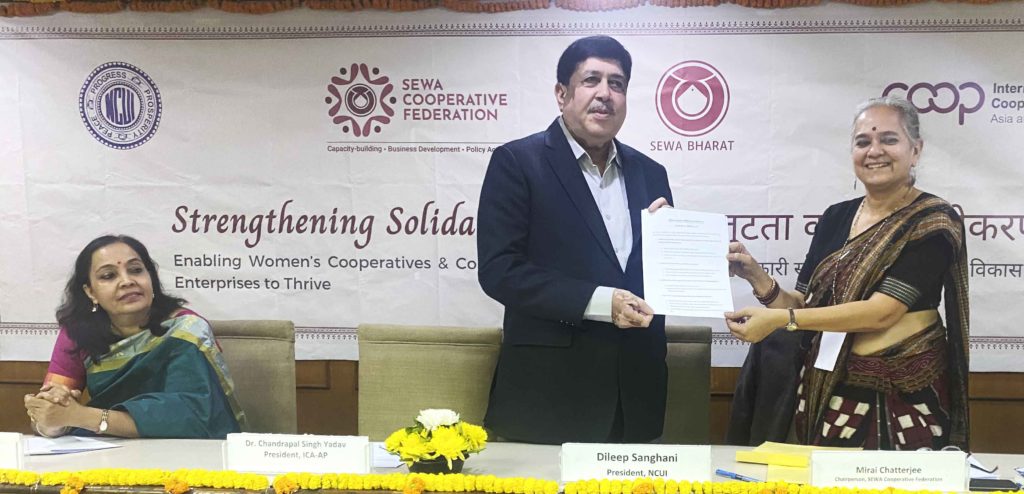The two-day national workshop on ‘Strengthening Solidarity: Enabling Women’s Cooperatives and Collective Enterprises to Thrive’ by SEWA Cooperative Federation in partnership with SEWA Bharat, NCUI and ICA-AP concluded Wednesday evening with the participants coming up with Delhi Declarations—a list of 15 points which women co-operators took a pledge to work on.
Dileep Sanghani who was the Chief Guest at the valedictory, boosted the morale of the participants when he said that a couple of days hence , the meeting of the national co-op policy panel is taking place in Mumbai and he (Sanghani) would place the Delhi Declaration before the meeting, hoping to get them incorporated into the national co-op policy.
The workshop explored four themes over the two days: ease of doing business, access to finance, governance and capacity-building, and digital inclusion, and will develop a set of recommendations to meet many challenges facing women-led cooperatives.
The recommendations known as Delhi Declaration of Women’s Cooperatives read “ We, members of 100 women cooperatives from 18 states of India, take a pledge to develop women’s leadership and solidarity, while promoting and strengthening the cooperative movement.”
For this the following steps are necessary-
The Delhi Declaration for Women Cooperators- A Draft
We, 100 women cooperators from 18 states of India, resolve to strengthen our solidarity and promote inclusive growth by promoting and strengthening women’s cooperatives and women’s leadership in the cooperative movement by undertaking the following:
1. Organise rural and urban women workers, especially those in the informal economy, into cooperatives for livelihood with social protection
- Undertake economic activities that are identified by women including agriculture, animal husbandry, crafts and other production, services, savings and credit, trading and manual labour, among others.
- Link women in cooperatives with government and other programmes and services to strengthen their livelihoods thereby supporting women’s economic empowerment.
- Ensure social protection of women in cooperatives, thereby supporting their economic empowerment by facilitating linkages with government and private social protection and social security providers.
2. Facilitate and provide access to financial services, including working capital and insurance
- Ensure a suitable and affordable stream of finance for women’s co-operatives through public and private sector
- Insure women cooperators, their businesses, machines and equipment by facilitating linkages with insurance companies
- Provide financial literacy and financial management training to women cooperators to strengthen and grow their businesses
3. Provide cooperative education and awareness on the cooperative model as a means of livelihood and social protection
- Educate women workers on the values and principles of cooperatives.
- Create awareness on the potential of cooperatives and the means by which they can provide livelihoods and social protection for women, build social solidarity and have social and economic impact at local, national and global levels.
4. Provide programmes and courses for capacity-building and strengthening leadership
- Develop appropriate training modules with women cooperators, and as per their needs.
- Develop a cadre of grassroot trainers with experience of working in cooperatives to provide hands-on and appropriate training.
- Provide opportunities for peer learning through exposure programmes, tailor-made courses and mentoring.
- Provide digital literacy training to bridge the gender digital divide and enable online marketing and other business linkages.
5. Advocate for appropriate laws, policies and programmes that promote women’s cooperatives and their collective entrepreneurship
- Create an enabling environment for ease of doing business by simplifying registration procedures, enabling creation and registration of innovative cooperatives, engaged in non-traditional economic activities, simplifying and streamlining compliance and reporting systems through a consultative process with women cooperators.
- Ensure that legislation and regulation of cooperatives and their federations, protect the cooperative’s autonomy and promote independent decision-making
- Promote and facilitate marketing of products and services of women’s cooperatives, both online and offline, through preferential procurement policies, waiving of deposit monies, capacity-building to navigate the current systems and simplifying these.
- Invest in women’s cooperatives and enable access to financial services at affordable rates, and provide support to actually obtain finance like loans and working capital, and insurance.
- Develop Women’s Enterprise Support Services to provide comprehensive business development services to women’s cooperatives through one window.
- Provide tax moratorium for women’s cooperatives upto Rs 20 Crore turnover.
- Support and enable digitization of women’s cooperatives and organise digital literacy to bridge the gender digital divide.
- Increase representation of women cooperators in cooperative boards, especially in those undertaking economic activities like farming conducted predominantly by women, executive committees of cooperative federations and in national and international cooperative forums.
- Ensure a special role for women cooperators and women’s cooperatives in disaster and emergency situations, by involving them in planning and implementation of all programmes and services for immediate relief and longer-term rehabilitation and resilience-building.
- Encourage research on, by and for women’s cooperatives.
- Link women’s cooperatives pro-actively with all new initiatives like the proposed cooperative university and export of their products and services.
- Link women’s cooperatives and their Federations with the G-20 process, showcase their contributions to the Indian and global economy and facilitate preferential procurement of their cooperatives’ products and services, including export orders.
